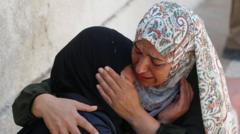The latest outbreak of hostilities between Israel and Iran began over the weekend and has seen a significant casualty toll. Israeli military operations dubbed "Operation Rising Lion" targeted key Iranian nuclear and military facilities, prompting President Trump's administration to weigh potential U.S. involvement. The conflict has killed over 220 individuals, primarily Iranian, according to official reports, while Israel has confirmed 24 fatalities due to Iranian missile strikes.
**Israel-Iran Conflict: Escalation and Implications on Global Diplomacy**

**Israel-Iran Conflict: Escalation and Implications on Global Diplomacy**
Tensions between Israel and Iran have reached a boiling point, escalating into a full-scale conflict with significant implications for regional stability.
The escalation was ignited on June 12 when Israel informed residents in military areas of Tehran to evacuate before launching missile strikes on Iran around 03:30 local time Friday. Notably, the Israeli defence forces targeted the Natanz nuclear facility, a move described by Prime Minister Netanyahu as essential to prevent Iran from obtaining nuclear weapons capability. Conversely, Iranian officials, including Supreme Leader Khamenei, condemned these strikes as acts of war, promising retaliation.
Iran responded by launching a significant missile attack, termed "True Promise 3," on various Israeli military targets. Despite Israel's defenses successfully intercepting many of the missiles, some managed to strike hospitals and civilian areas, raising further concerns about the impact on non-combatants, particularly following incidents where hospitals were hit, leading to civilian injuries.
Amidst this and a backdrop of US-Iran tensions regarding nuclear capabilities, President Trump is contemplating military options in support of Israel, including advanced munitions capable of disrupting deeply buried Iranian sites. However, the precariousness of this situation is heightened by a potential split within the President's advisory circle regarding military intervention.
Both world powers and regional actors are closely monitoring the conflict, as the ramifications could extend beyond territorial disputes to influence global diplomacy surrounding nuclear proliferation and Middle Eastern power balances.
With ongoing military exchanges and a backdrop of failed diplomatic negotiations, the future remains uncertain, posing significant risks for further escalation.
**Summary:** As Israeli-Iranian hostilities intensify, the potential for U.S. involvement looms large. With numerous fatalities reported on both sides, the conflict raises urgent questions about regional stability and global diplomatic relations concerning nuclear weapons.
Iran responded by launching a significant missile attack, termed "True Promise 3," on various Israeli military targets. Despite Israel's defenses successfully intercepting many of the missiles, some managed to strike hospitals and civilian areas, raising further concerns about the impact on non-combatants, particularly following incidents where hospitals were hit, leading to civilian injuries.
Amidst this and a backdrop of US-Iran tensions regarding nuclear capabilities, President Trump is contemplating military options in support of Israel, including advanced munitions capable of disrupting deeply buried Iranian sites. However, the precariousness of this situation is heightened by a potential split within the President's advisory circle regarding military intervention.
Both world powers and regional actors are closely monitoring the conflict, as the ramifications could extend beyond territorial disputes to influence global diplomacy surrounding nuclear proliferation and Middle Eastern power balances.
With ongoing military exchanges and a backdrop of failed diplomatic negotiations, the future remains uncertain, posing significant risks for further escalation.
**Summary:** As Israeli-Iranian hostilities intensify, the potential for U.S. involvement looms large. With numerous fatalities reported on both sides, the conflict raises urgent questions about regional stability and global diplomatic relations concerning nuclear weapons.





















